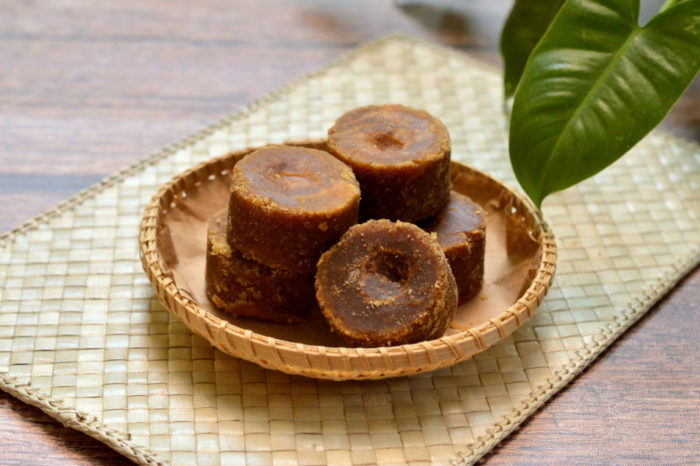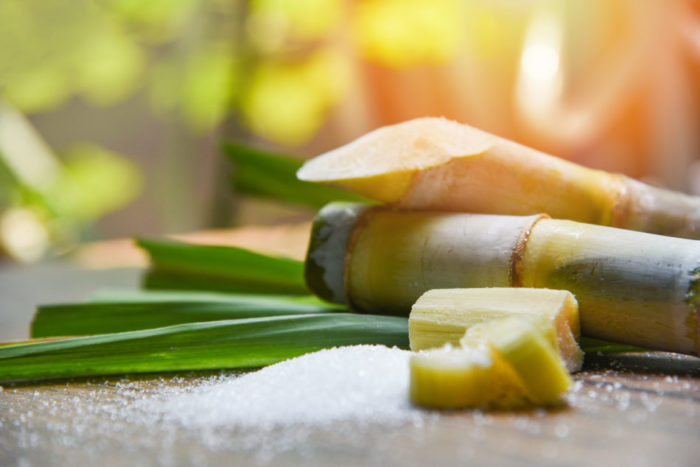If you want a sweetener, it’s worth taking a look at palm sugar vs cane sugar. Both these sugars are the talk of the town and offer some very interesting prospects. Cane sugar is arguably the more common type of sugar, often called table sugar. This is the one we usually think of when we talk about sugar in general.
Palm sugar though has been gaining in popularity. It tastes relatively mild compared to conventional sugar, which is to say it doesn’t have that sharp, sugary taste. Coconut palm sugar is sometimes labeled palm sugar as well. However, it’s worth remembering that coconut sugar and palm sugar are different.
On that note, let’s see what’s the lowdown with cane sugar and palm sugar.


Palm Sugar vs Cane Sugar
Differences Between Palm Sugar And Cane Sugar
Let’s take a journey to a better understanding of these sugars by the elements that separate them.
The biggest difference between these sugars is their source. Cane sugar, as the name implies, comes from sugarcane. During production, sugarcanes are crushed to release their juice, which is then processed into the white and sweet crystals that we know.
Palm sugar, on the other hand, is produced using the sap of various palm trees, in particular the sugar palm tree (Arenga Pinnata). The sap then undergoes boiling in large vats to form a sweet paste. Palm sugar is generally available as a paste or a syrup. Crystallized palm sugar is available as well, though it’s less common.
Their sweetness is another differentiating factor. Cane sugar is relatively quick with its sweetness and feels more sharply sweet. Palm sugar feels relatively less sweet and avoids a quick sickly-sweet sensation. This also means that if you’re substituting cane sugar with palm sugar, you’ll have to add more of the latter for the same sweetness.
Then there’s also the question of the Glycemic Index (GI), though this one is somewhat controversial. Cane sugar has a GI of 50. The GI of palm sugar is somewhat debatable, some sources put it at 35, while others put it at 50-54. A lower GI is considered better, which is why palm sugar is often touted as a healthier option. I’d suggest being skeptical of claims of lower GI.
Another claimed health benefit of palm sugar is the presence of nutrients like calcium, zinc, potassium, and iron. These are generally present in coconut sugar, not date palm sugar. It’s one of the points where the broader labeling of palm sugar to include coconut sugar creates misconceptions.
On Differences Between Coconut Palm Sugar And Cane Sugar
Since coconut sugar or coconut palm sugar inevitably gets bundled with “palm sugar”, it’s worthy of a quick comparison.
The coconut tree is a type of palm tree and its sap may be used in the production of palm sugar. However, coconut sugar is an entirely different beast. This sugar comes from the flower of the coconut tree, rather than its trunk. A small cut is made at the base of the flower, from where the sap is collected over time.
This sap is then boiled to create a paste or crystals. As with palm sugar, coconut sugar isn’t as sweet as cane sugar. Although, coconut sugar contains a fair amount of nutrients and is a healthier choice when compared to cane sugar.
There is again the question of the GI. As claims go, the presence of a fiber called inulin reduces the GI of coconut sugar to 35. Competing studies don’t show any such benefits and put coconut sugar GI at 50-54. I’ll suggest erring on the side of caution and assuming a higher GI.
Cane sugar, coconut sugar, and palm sugar don’t have any specific benefits for diabetics. Any claims of a lower GI should be treated skeptically until better information or studies are available.
FAQ And Related Points
Is Coconut Sugar Better Than Cane Sugar?
Coconut sugar is better than cane sugar in its nutrient profile. It contains zinc, potassium, calcium, and iron along with a few other nutrients. Some claims say coconut sugar has a lower Glycemic Index (GI), but that part is disputed. A different set of claims puts the GI of coconut sugar at the same level as cane sugar.
It’s worth noting that cane sugar is sweeter than coconut sugar. If you’re replacing cane sugar with coconut sugar, the recipe will need a higher quantity of coconut sugar for the same sweetness.
Is Cane Sugar Healthy?
There are no tangible health benefits of cane sugar. It does provide carbohydrates and energy to the body, but that is true for all sugars. There are no other nutrients or health advantages for cane sugar.
Are There Any Benefits Of Palm Sugar?
Palm sugar has a deliciously sweet caramel flavor, which you might enjoy. While there are health benefits sometimes attributed to palm sugar, they are either premature or controversial. It’s often attributed a lower Glycemic Index, but that may not be exactly true. Similarly, the claims of higher nutrient value or their benefits are questionable as well.
The Sweetest Pick For You
In a comparison of palm sugar vs cane sugar, it is better to keep your focus on taste. While people often end up considering claims of glycemic value or nutrients, these may not necessarily hold true. A better approach would be to focus on the sweetness or taste profile you want, rather than unconfirmed attributes like GI and nutrient profile.
